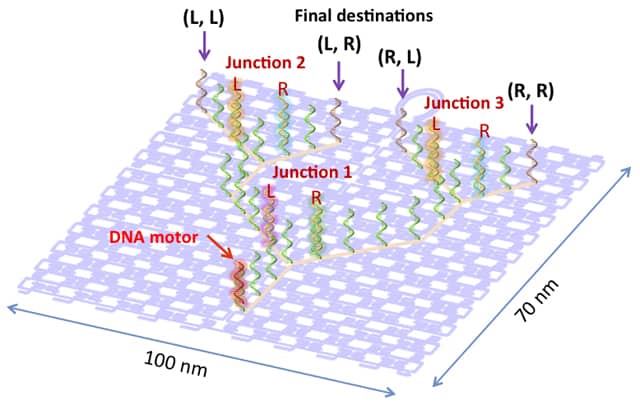Scientists at Kyoto University and the University of Oxford have combined DNA origami and DNA motors to take another step toward programmed artificial molecular assembly lines.
DNA motor navigates network of DNA tracks


Scientists at Kyoto University and the University of Oxford have combined DNA origami and DNA motors to take another step toward programmed artificial molecular assembly lines.
An article in The Guardian quotes Christine Peterson and Robert Freitas on the vision of molecular manufacturing. Freitas is quoted as expecting that the development of nanofactories could be done in 20 years for “on the order of” one billion dollars.
A four-step unidirectional molecular motor driven by light and temperature changes catalyzes different chemical reactions at different steps of its rotary cycle.
A tutorial review available after free registration presents a theory-based exploration of the difficulty in moving from simple molecular switches to arrays of artificial molecular machines capable to doing substantial, useful external work.
RNA CAD tools developed for RNA-regulated control of gene expression in synthetic biology successfully engineered metabolic pathways in bacteria. Will engineering RNA-based genetic control systems lead to design tools for other RNA-based molecular machine systems?
When can we expect advanced nanomachinery to be commercialized? Will any technologies not be affected in some way by advanced nanotechnology?
How small could a molecular switch be made? It is difficult to think of one smaller than the single proton switch just demonstrated by this group in Germany.
A tutorial review addresses the distinction between the many simple artificial molecular devices that are currently available and truly effective artificial molecular machines that would mimic the ubiquitous molecular machines present in living systems.
In a lecture at Oxford Eric Drexler argued that atomically precise manufacturing will be the next great revolution in the material basis of civilization, and discussed how we can establish reliable knowledge about key aspects of such technologies.
Electron tunneling drives a conformational change in each wheel of a four-wheel drive, single molecule nanocar, driving it across a copper surface.